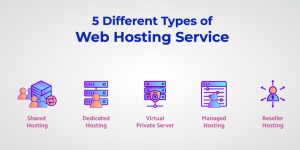Advertisement
Introduction
You might have heard that there are different types of web hosting. But what does that mean? And which one is right for you? In this article, we’ll explore the different types of web hosting and help you decide which one is the best fit for your business.
What Is Web Hosting?
So, what is web hosting? In basic terms, web hosting is a service that allows your website to be live on the internet. When someone types in your website address, the web hosting service directs them to the server where your website files are stored.
Advertisement
There are a few different types of web hosting services to choose from, so it can be a little overwhelming trying to figure out which one is right for you. That’s why we’re here to help! In this article, we’ll explain the different types of web hosting and help you decide which one is best for you.
Shared Hosting – Pros & Cons
Shared hosting is one of the most popular types of web hosting. It’s perfect for small businesses, personal websites and blogs, and for people who are just starting out. Shared hosting is a great option because it’s affordable and you can usually get up and running in minutes.
Advertisement
Advertisement
Advertisement
But there are some drawbacks. Because your website is sharing space with other websites, your site’s performance can be affected if someone else on your server is experiencing a lot of traffic. You also don’t have as much control over your website as you would with other types of hosting.
If you’re just starting out and you’re on a budget, shared hosting is a good option. But as your business grows, you may want to consider upgrading to a more robust hosting package.
VPS Hosting – Pros & Cons
If you’re looking for more power and control over your hosting, then a Virtual Private Server (VPS) might be right for you. This type of hosting gives you a bit more flexibility and independence than shared hosting, as you’re essentially renting your own server space.
Sounds great, right? There are some pros to consider:
– You have root access, giving you more control over your server environment
– You can install any software you like
– You have more storage space and bandwidth than with shared hosting
However, there are also some potential cons to think about:
– You need to be comfortable managing your own server environment
– You need to be knowledgeable about server security issues
– It can be more expensive than other types of hosting
Dedicated Server Hosting – Pros & Cons
If you’re looking for ultimate control, dedicated server hosting might be for you. This type of hosting allocates a single server to your web hosting needs, making it the most powerful and expensive option.
When it comes to pros, with dedicated server hosting, you get full root access. Plus, you know that your resources won’t be shared with any other websites. On the downside, though, dedicated server hosting plans can cost anywhere from $50 per month to over $200 per month. So it really depends on your budget for website hosting and the features you need.
It’s also important to note that if you go with dedicated server hosting, your website will require specialized skills like system administration and security maintenance. You will basically become responsible for managing the entire server yourself or hiring someone else to do it—which can add additional costs to your website hosting budget.
Cloud Computing Solutions – Pros & Cons
Cloud computing solutions are becoming increasingly popular among small to medium businesses. This type of hosting is an on-demand access to a pool of computing resources, such as networks, servers, storage and applications.
The advantages of cloud computing include scalability and flexibility in terms of budgeting. With cloud hosting, you can decide how much processing power and data storage you need and only pay for what you use. In addition, with cloud hosting you are not responsible for setting up the hardware—it’s a hands-off process with no maintenance.
However, one disadvantage is that cloud hosting can be more expensive in the long run than traditional hosting—especially if your business relies heavily on internet usage or data traffic. Additionally, the security aspects of cloud hosting may be cause for concern since you do not have control over your data.
Choosing the Right Type of Web Hosting for Your Website
Before you make the decision of which type of web hosting to go for, it’s important to know the limitations and advantages of each type. Consider the size and needs of your website when choosing the right type of hosting.
Dedicated hosting is great for websites that require more bandwidth, as it offers more resources and customization than other types. It’s also a good choice when you need extra security features like firewalls and spam filtering. However, it can be expensive, so it’s better suited to larger websites with higher traffic levels.
Shared hosting may be the best choice if you’re just starting out or have a small website. It’s more affordable than dedicated hosting, and doesn’t require as much maintenance since the server resources are shared among multiple users. That said, it can be slow at times due to heavy traffic on other websites hosted on the same server.
Virtual Private Servers (VPS) offer an affordable alternative to dedicated hosting without sacrificing too much power or flexibility. You get your own server resources but still share CPU and memory with other VPS customers on the same physical server — which can help cut costs significantly compared to dedicated servers.
Conclusion
In conclusion, each hosting type has its own set of pros and cons, so it’s important that you do your research and figure out which type is best for you. If you have a small business and you don’t need a lot of storage space or bandwidth, then a shared hosting plan may be the best option for you. If you have a large website that gets a lot of traffic, then you may need to consider a VPS or dedicated hosting plan.







